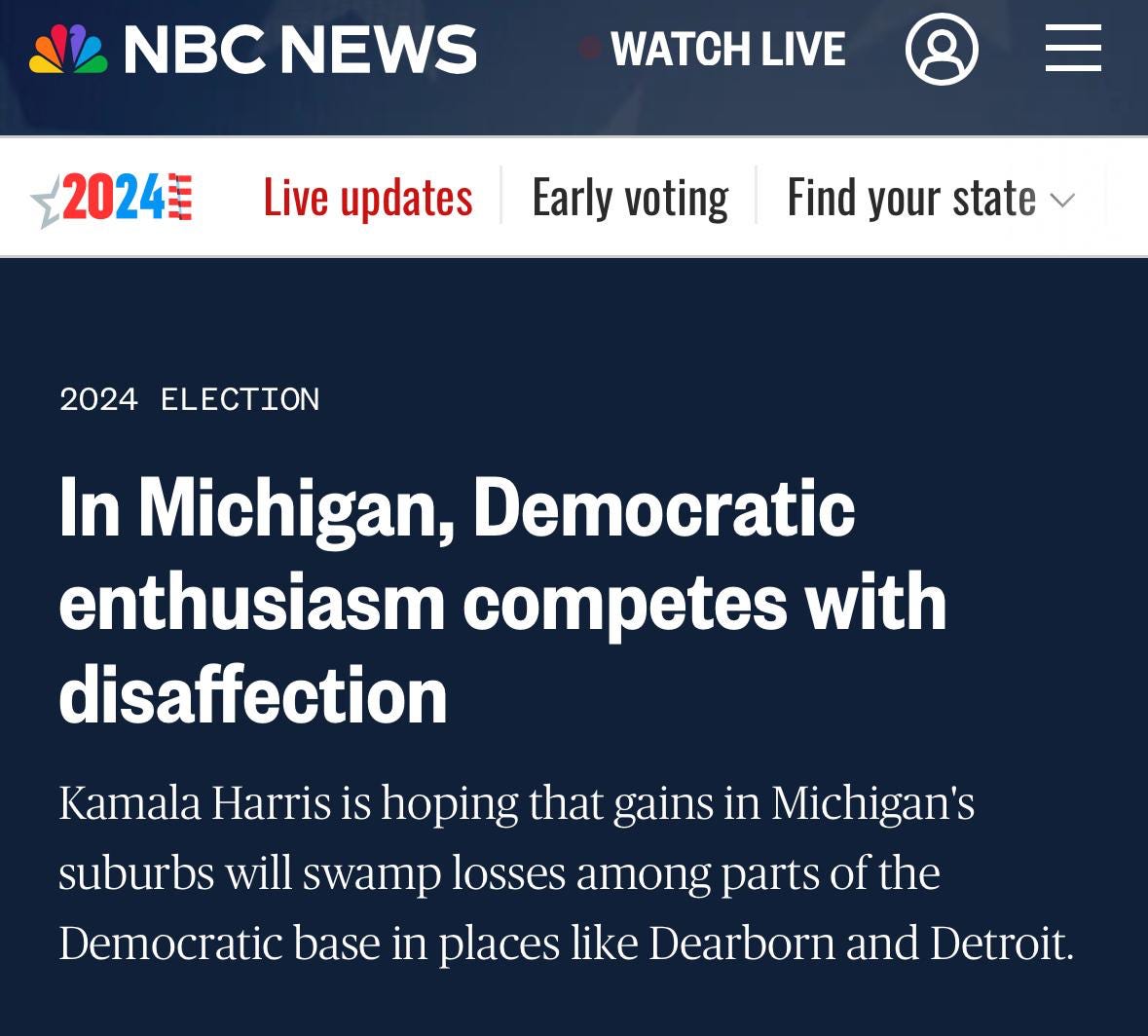There is a profound sadness in watching Kamala Harris’s vision for multiracial democracy unravel at its most vital edge—Muslim and Arab Americans. For nearly a decade, Democratic leaders have correctly warned that Trump’s hatred starts with us. But as we stand on the brink of another pivotal election, Harris’s fear of the AIPAC network and her unwillingness to publicly engage with Palestinian and Lebanese American families impacted by U.S.-supplied Israeli bombs mark a glaring exception in her political vision.
Trump’s shameless lies find an eager audience in Arab and Muslim communities, not because they’re believed, but because they fill the anti-war void that Harris has left gaping wide. He shows up; she doesn’t. It’s a cruel irony that Harris’s cautious distance has paved a clear lane for Trump, whose hollow promises now feel like a real option for a community filled with despair. Fact-checks won’t fix this—it’ll take courage and real engagement, something Harris seems unwilling to offer, even as Trump’s BS starts to land where it never should have.
Harris’s inability to see us and to acknowledge our pain isn’t merely a miscalculation in a long campaign, but a breach in the very soul of her promise of multiracial democracy. It’s a vision that rings hollow where it should resonate most deeply—at the core of those most threatened by fascism and white supremacy.
In this moment, I find myself thinking of John Lewis’s speech at the March on Washington in 1963, where he called out both parties for their failures. He asked:
My friends, let us not forget that we are involved in a serious social revolution. By and large, American politics is dominated by politicians who build their careers on immoral compromises and ally themselves with open forms of political, economic, and social exploitation. There are exceptions, of course. We salute those. But what political leader can stand up and say, “My party is the party of principles”? For the party of Kennedy is also the party of Eastland. The party of Javits is also the party of Goldwater. Where is our party? Where is the political party that will make it unnecessary to march on Washington?
I also think of Frederick Douglass’s painful words about Lincoln’s moderation:
The Republican Party is, as I have often said in conversation with you, only negatively anti-slavery. It is opposed to the political power of slavery, rather than to slavery itself, and would arrest the spread of the slave system, humble the slave power, and defeat all plans for giving slavery any further guarantee of permanence. This is very desirable, but it leaves the great work of abolishing slavery, and giving freedom to the four millions now groaning in the chains and under the lash of slavery, still to be accomplished.”
Just as Douglass criticized leaders for opposing the power of slavery without confronting slavery itself, today’s politics around racism and Islamophobia feel eerily similar. Like Douglass’s critique, the opposition is often only to the power of these biases, not to the systems themselves. Kamala Harris’s reluctance to sit with Palestinian and Lebanese American families, or to even publicly engage with their pain, let alone their policy demands, reflects this failure. The promise of multiracial democracy remains incomplete, a performance that dances around the edges of justice without ever reaching its heart.
Over the past year, I’ve had countless conversations with Democratic officials, consultants, and staffers. They start with sympathy: “It’s horrific, what’s happening in Gaza. We appreciate what you’re doing.” But then comes the pivot: “Change takes time; the other side is so much more powerful.” It’s a familiar refrain, one that’s almost become muscle memory within the party—an acceptance that this is how things are, and perhaps even how they must be.
It’s maddening. When I press them further, I don’t hear defenses of the weapons we send to Israel. Instead, there’s a quiet resignation: “The politics are complicated,” they say, referencing donors, constituents, and the deeply ingrained pro-Israel sentiment cultivated over decades. It’s a polite shrug in the face of a moral catastrophe. There’s no urgency to shift course, only a weary acceptance that progress, if it comes, will be painfully slow.
The scrutiny, meanwhile, lands on youth, Muslims, Arabs, and Palestinians who are trying to shift the status quo. They are the ones interrogated and challenged at every turn, their tactics dissected and critiqued by the very establishment that maintains the imbalance. Meanwhile, the deeply entrenched forces within the Democratic Party, those preserving unconditional weapons transfers and defending the status quo, go largely untouched and unquestioned.
It’s as if the AIPAC network’s grip on power is treated as the inevitable order of things—a permanent fixture of political life. We’re told to accept this imbalance as fact, as if it’s beyond change, beyond critique, until some distant “right time” finally arrives. The truth is, we are always waiting for a more convenient time.
Many people are quick to tell Muslims and Arabs they can’t afford to be “single-issue voters,” as if their core concerns are luxuries in a broader agenda. Yet that same caution is rarely, if ever, applied to the AIPAC network. Few lecture the hawks in the pro-Israel lobby about needing to moderate its priorities for the sake of the rest of the coalition. Their single-minded dedication to one cause is treated as regular politics, while Muslims and Arabs are told their lives and rights must be weighed against other political considerations.
It’s strange, too, that Arabs and Muslims are labeled uniquely irrational for voting on their self-interest, while white working-class voters have long backed a GOP that weakens unions, slashes the social safety net, and cuts taxes for billionaires. The double standard is stark—one group’s focused commitment is called normal, while the other’s is dismissed as irrational and out of bounds.
The question isn’t if change takes time—it does. But time can be either an excuse or a catalyst. And right now, it’s being used as an excuse. The political convenience of waiting is dressed up as wisdom, while urgency is dismissed as impractical.
But what is a “ceasefire” when nearly 2 million people have been expelled from their homes, their world reduced to rubble? When mass expulsion of Palestinians is no longer a distant fear but an unshakable fact? It doesn’t feel like peace. It feels like the completion of a horrific project of ethnic cleansing, for which our party bears a heavy responsibility.
We are not entering a post-conflict phase; we are in a post-ethnic cleansing nightmare. Ethnic cleansing is no longer a looming threat, but a brutal, unfolding, completed reality.
The current moment demands something deeper than empty promises of multiracial democracy. It demands a politics that does not merely acknowledge the pain of the marginalized but actively centers it. As John Lewis asked over half a century ago: Where is our party? Where is the political courage that will make it unnecessary to march, to plead, to beg for our humanity to be recognized?
Don’t get me wrong—I’m voting for Harris and deeply fear Trump and his shameless campaign of lies and fraud. But her campaign’s strategy baffles me. Banking on white moderate voters to overwhelm disaffection among youth, Arabs, and Muslims is extremely risky, both politically and morally. I want her to have a real mandate to deliver change for people at home and abroad. But without clear commitments in her campaign, I understand why many fear her vision will be captured by the same foreign policy blob and donor-driven establishment forces that got us here in the first place.
It took decades for the party to find its backbone on abortion; it wasn’t courage born overnight but a slow, reluctant awakening after rights were taken away. I can only hope they’ll someday muster that same fire for Palestinian human rights—though it’s a prayer that feels heavy with doubt. The waiting is wearying, the excuses familiar, and the urgency, as always, postponed.
It is not enough to speak of multiracial democracy as a theoretical ideal. Democracy must be lived, breathed, and practiced, not only when it is politically expedient but also when it is most inconvenient. Otherwise, it is not a true democracy—it is simply a performance.
The great work of building multiracial democracy will remain unaccomplished.







Filthy zionist. You will pay for supporting the babykiller Harris.
I will also say this, sir, Harris (and Biden) will be on the wrong side of History- you will be on the right side of History, 50 years from now.